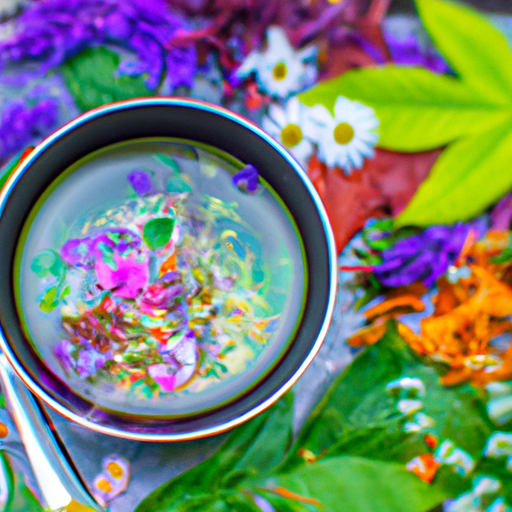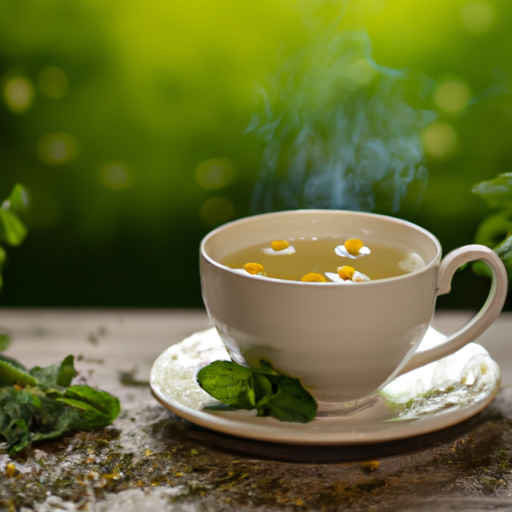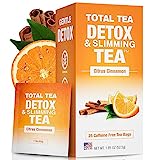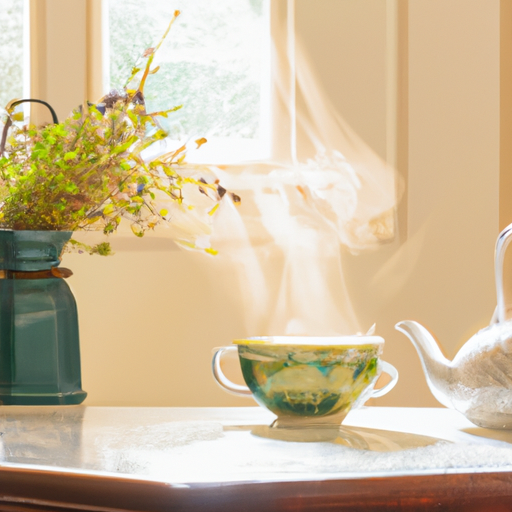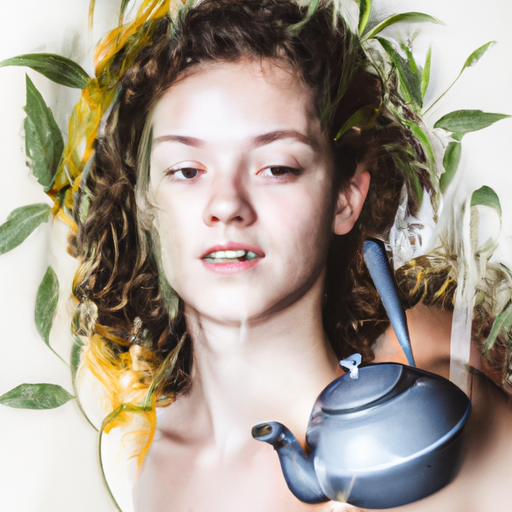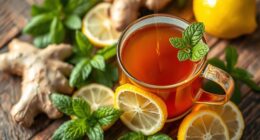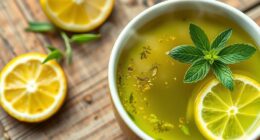Imagine this scenario: You’re seated in a charming cafe, enjoying a hot and aromatic drink. The steam wafts from your cup, softly brushing against your nose as you savor a gentle sip. The flavor is calming, reassuring, and it’s akin to a warm embrace for your spirit.
But what do you call this delightful elixir? Is it tea? Or is it something else entirely? This question has sparked a heated debate among tea enthusiasts and herbal beverage lovers alike. Should we call it herbal tea or herbal infusion?
As someone who appreciates the nuances of language and the power of words, I find myself pondering this dilemma. In this article, we will explore the origins, history, and cultural perspectives surrounding this naming conundrum.
Ultimately, the decision lies in personal preference, but let’s delve into the arguments for both sides and discover what this beloved drink should truly be called.
Key Takeaways
- Herbal infusions are made by steeping various parts of plants like flowers, herbs, fruits, and spices.
- Different cultures have embraced the healing properties of herbal infusions for centuries, with Chinese culture referring to it as ‘liang cha’ and Ayurvedic traditions calling it ‘rasayanas’.
- Herbal teas offer a wide range of health benefits depending on the specific plants used, including promoting relaxation, boosting the immune system, aiding digestion, and alleviating common ailments.
- The term ‘herbal tea’ has become widely accepted and understood by consumers, but terms like herbal infusion, tisane, and herbal tea can all be used based on personal preference.
Understanding the Difference Between Tea and Herbal Infusions
If you’ve ever wondered why herbal tea doesn’t taste like ‘real’ tea, it’s because herbal infusions are not actually tea at all. Unlike traditional tea, which is derived from the leaves of the Camellia sinensis plant, herbal infusions are made by steeping various parts of other plants, such as flowers, herbs, fruits, and spices. This process allows the flavors and health benefits of these plants to be extracted into the hot water.
Herbal teas offer a wide range of health benefits, depending on the specific plants used. For example, chamomile tea is known for its calming properties, while peppermint tea aids digestion. Understanding the process of making herbal teas and the health benefits they offer is important in appreciating their unique qualities.
Moving on to the origins and history of herbal infusions, we can further explore their cultural significance and how they have been used throughout time.
The Origins and History of Herbal Infusions
Originating from ancient cultures and deeply rooted in the history of civilizations, these aromatic infusions have captivated the taste buds of countless generations.
-
Rich tradition: Herbal infusions have been used for centuries in traditional medicine to promote wellness and treat various ailments.
-
Health benefits: These natural brews offer a myriad of health benefits, such as boosting immunity, aiding digestion, and relieving stress.
-
Cultural significance: From Chinese herbal teas to Ayurvedic concoctions, different cultures have embraced the healing properties of herbal infusions for centuries.
These herbal infusions, with their rich history and impressive health benefits, have played a vital role in traditional medicine. Now, let’s delve into the fascinating world of exploring alternative names for herbal tea.
Exploring Alternative Names for Herbal Tea
Embracing the diverse language of herbal infusions, these soothing brews are known by a multitude of alternative names that evoke images of nature’s healing touch.
Exploring unique herbal blends is not only a way to showcase the creativity and innovation of tea makers, but also a marketing strategy to attract a wider audience.
With catchy names like ‘Herbal Elixir’ or ‘Nature’s Potion,’ these blends capture the essence of the ingredients and appeal to health-conscious consumers.
By highlighting the specific benefits of each blend, such as ‘Stress Relief’ or ‘Digestive Aid,’ tea companies can effectively market their products and educate consumers about the healing properties of herbal infusions.
As we delve into the case for calling it herbal tea, it becomes evident that this simple and straightforward name encompasses the essence of these comforting and therapeutic beverages.
The Case for Calling it Herbal Tea
Imagine sipping on a warm, soothing beverage that conjures up images of nature’s healing touch – that’s the power of embracing the name for these comforting and therapeutic infusions. Herbal tea, as it’s commonly known, offers a plethora of health benefits that have been celebrated for centuries.
Exploring the health benefits of herbal tea reveals its ability to promote relaxation, boost the immune system, aid digestion, and even alleviate common ailments like headaches and insomnia. It’s a natural remedy that harnesses the power of plants to enhance overall well-being.
Debunking common myths about herbal tea is essential to understanding its true potential. Contrary to popular belief, herbal tea doesn’t contain caffeine and is therefore a suitable option for those seeking a caffeine-free alternative. It’s also worth noting that herbal tea isn’t technically tea, as it isn’t derived from the Camellia sinensis plant. However, the term ‘herbal tea’ has become widely accepted and understood by consumers.
Transitioning to the subsequent section, the argument for using the term ‘herbal infusion’ provides an alternative perspective worth considering.
The Argument for Using the Term "Herbal Infusion"
Why not consider using the term ‘herbal infusion’ instead of the traditional name for these soul-soothing elixirs? While the term ‘herbal tea’ has been widely used for centuries, it has the potential to cause confusion among consumers. By using the term ‘herbal infusion’, we can accurately convey the process of steeping herbs in hot water to extract their beneficial properties.
Consider the benefits of herbal infusions: they can help with digestion, promote relaxation, and boost the immune system. Moreover, herbal infusions are often caffeine-free, making them a great alternative for those looking to reduce their caffeine intake.
To add depth to this discussion, let’s explore two sub-lists:
-
The versatility of herbal infusions: They can be enjoyed hot or cold, and can even be used as a base for cocktails or cooking.
-
The wide variety of herbs available: From chamomile to peppermint, each herb offers unique flavors and health benefits.
With this in mind, it becomes clear that the term ‘herbal infusion’ is a more accurate and encompassing way to describe these beverages. Moving forward, let’s delve into the cultural perspectives on naming herbal beverages.
Cultural Perspectives on Naming Herbal Beverages
Consider exploring the cultural perspectives on naming these soul-soothing elixirs, as they offer valuable insights into the significance and meaning behind different terms used to describe herbal infusions.
Herbal beverages hold a deep cultural significance in many societies, where they have been used for centuries as remedies, rituals, and traditional practices. Language and symbolism play a crucial role in naming these drinks, reflecting the beliefs, traditions, and historical context of each culture.
For example, in Chinese culture, the term ‘herbal tea’ is known as ‘liang cha,’ which translates to ‘cooling tea’ and emphasizes its cooling properties. In contrast, Ayurvedic traditions refer to herbal infusions as ‘rasayanas,’ meaning rejuvenating tonics. These diverse naming conventions highlight the cultural diversity and unique understanding of herbal beverages across different societies.
Understanding the language and symbolism behind the naming of herbal drinks can deepen our appreciation for their cultural significance. Transitioning into the subsequent section, it’s interesting to explore how individuals embrace their personal preferences in naming these beverages.
Embracing Personal Preference: What Do You Call It?
Embracing your personal preference, what’s your go-to name for this soul-soothing elixir?
When it comes to herbal tea, there are various terms people use to refer to this delightful beverage. Some call it herbal infusion, emphasizing the process of steeping herbs in hot water. Others prefer the term tisane, which traditionally refers to a medicinal herbal drink. Then there are those who simply stick to calling it herbal tea, as it’s the most commonly recognized term.
The beauty of embracing personal preference is that there’s no right or wrong answer. It all comes down to defining your own preferences and choosing a name that resonates with you. After all, the importance of personal choice shouldn’t be underestimated when it comes to something as soothing and comforting as a warm cup of herbal goodness.
Frequently Asked Questions
What are the health benefits of herbal tea?
Herbal teas offer a range of health benefits. For example, chamomile tea can help with sleep, while peppermint tea aids digestion. Herbal teas also promote relaxation and reduce stress levels, making them a great addition to a wellness routine.
Are there any potential side effects or risks associated with drinking herbal tea?
Potential interactions with medications and herbal tea during pregnancy should be considered. It’s important to be aware of any risks or side effects that may arise. It’s always best to consult with a healthcare professional for personalized advice.
How can I make my own herbal tea at home?
To make homemade herbal tea, you can try various recipes using the best herbs for tea making. Some popular options include chamomile, peppermint, and ginger. Experiment with different combinations to find your favorite blend.
Can herbal tea help with weight loss?
Sure, herbal tea is a great way to lose weight! But here’s the twist: green tea is actually more effective. And sorry honey lovers, adding it to herbal tea won’t affect its weight loss benefits.
Are all herbal teas caffeine-free?
Differentiating caffeine-free herbal teas from those with caffeine content is important. It is essential to explore the potential impact of caffeine in herbal teas on health, as not all herbal teas are caffeine-free.
Conclusion
In conclusion, the debate over what herbal tea should be called is a matter of personal preference and cultural perspective. While some argue for calling it herbal tea due to its similarity to traditional tea, others advocate for the term ‘herbal infusion’ to emphasize the differences in ingredients. Ultimately, what matters most is the enjoyment and satisfaction derived from these delightful beverages.
As the adage goes, ‘A rose by any other name would smell as sweet.’ So, whether you call it tea or infusion, sit back, relax, and savor the flavors of nature’s bounty.

